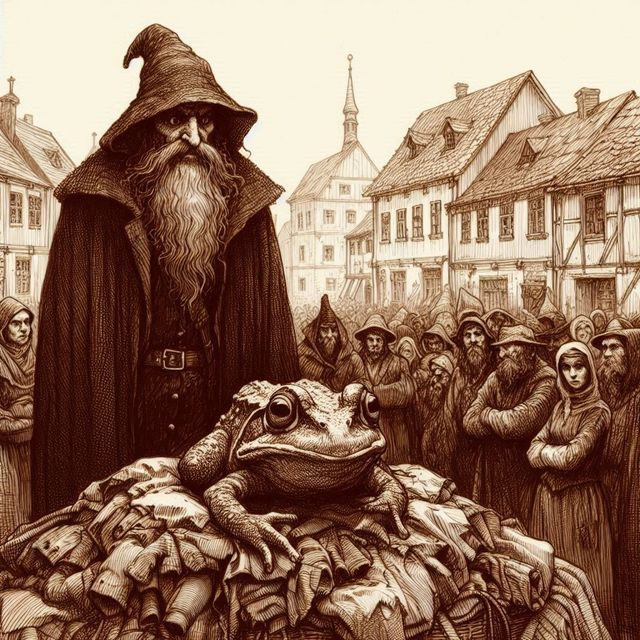-
Vijay Fafat
- Published on
A lovely tale which merges mathematics / logic systems and magic to a satisfying conclusion. And what a great hook of a tagline in the story! “On Arrey, you could survive - as a frog. Unless you could solve Bessel’s Equation…”
Endive was a “Merlin Planet”, a secluded planet “far off from the main sequence of Zipstar routes”, with a small human colony co-existing with the local population of magicians and serfs in a place called “Arrey”. As the Catalog described:
“A merlin planet is a generic term for certain, very unusual planets which have technologically primitive cultures in which magic plays a strong role. They are closed to ordinary interstellar commerce, except for special franchises.”
On Endive, a class of people - the wizards - could put conjuring spells on a weaker class of local denizens, the serfs, and convert them into all sorts of objects (though a frog seems to be the choice du jour). The humans had been unable to ferret out, despite all their technological superiority, the reason which enabled this suspension of physical laws on Endive.
“They have a funny chemistry and a funny minerology. […] The trouble with the place is that there is something about it that is - well, call it hallucinogenic if you like. If somebody spells you into being a frog, you think you are a frog and so does everybody else, including the animals.”
“You mean it’s an illusion. A hypnotic gas in the atmosphere or something like that.”
“Scratch the hynotic gas and anything like that. Consolidated spent a whole year with their regional research staff trying to isolate a physical cause, and they couldn’t do it. They ended up with some mishmash about psionic feedback, which might satisfy them, but it didn’t help us any. […] Call it mass hypnosis, if it makes you any more comfortable. Only there’s a strange side effect on Endive. Given the necessary environment for good frog survival, you can last indefinitely. As a frog, that is.”
“But how-”
“That’s the reason for the postulate of psionic feedback. The ecology is stable. An enchanted frog is just as good as a natural one here on Endive.”
But the humans, after their initial attempts at contact led to many people being lost as enchanted animals, figured out that there was something about mathematical thought which not only countered the local magic but also scared the wizards significantly.
“All you have to do is go through some fairly elaborate mathematical pattern in your head. Like, for instance, solving Bessel’s equation.”
“Bessel’s equation,” murmured Jerrold.
“Well, it doesn’t have to be Bessel’s equation necessarily. That’s just an example. It happens that my favorite counter-spell is LaPlace’s equation in cylindrical coordinates. By the time I’ve separated the variables and got into the Bessel part of it, every wizard within spitting distance is completely terrified. Nobody knows why, but the local wizards can feel it when you just think this sort of thing at them.[… However,] unless you understand the significance of the pattern, it doesn’t work.”
“Surely there must be something else-”
“It’s too new to tell. The research boys at Regional Headquarters say that the sophisticated evocation of a complete, self-consistent logical pattern like mathematics interferes with local patterns already resonant in the psionic feedback net.”
[…]
“We all know a little math, here, but there isn’t a single one of us who is really good at it. So what we do is take a walking stick and carve the key steps on it. It is very much like an ancient Irish ogam stick. For those of us who know the code, it’s a mnemonic device. For the Endese, it’s a magic wand. “It’s a pity we couldn’t get a really good mathematician in here. He might be able to neutralize the whole region for months, and it would be easier for us. What’s more, somebody like that might be able to teach enough math to the serfs so that they might be able to protect themselves.”
So far, so good. But then arrived a new recruit, Jerrold, who was not a mathematics graduate (since they were very expensive) but one who specialized in Law (and was very good at chess.) Without mathematical thought, he looked very vulnerable against the local wizards… till he figured out the essence of the counter-magic:
“Jerrold got little sleep that night. He spent the time going over in his mind the whole illogical situation. The Endese had magic. Magic was illogical. There was a psionic feedback network operative on Endive, according to Finn. This might be logical, but why should it be that the thinking through of a complicated mathematical theorem interfered with the magic? Jerrold knew little math, but he was convinced that the most important thing about math was consistency of logic. Beginner’s math was of no value, so Finn had indicated, because it did not represent a complete system. The conclusion, therefore, must be that it was necessary to have recourse to a complete, logical system in which there was no room for the non-causal relations which represented magic. Eventually, he drifted into a doze, trying to think about complete, l..ogical systems in which no non-causal relations existed.”
With that burgeoning thought, Jerrold concluded that any consistent, air-tight logical system of thought could throw the magic of Endive in disarray. He then went on to defeat the greatest rogue magician in that region and led the emancipation of the serfs… by teaching them the rules of chess and checkers, particularly the end games of chess, where the logical analysis to a final decision and the rules of moves to a conclusion are inexorable, unambiguous…
Very well-recounted story.
